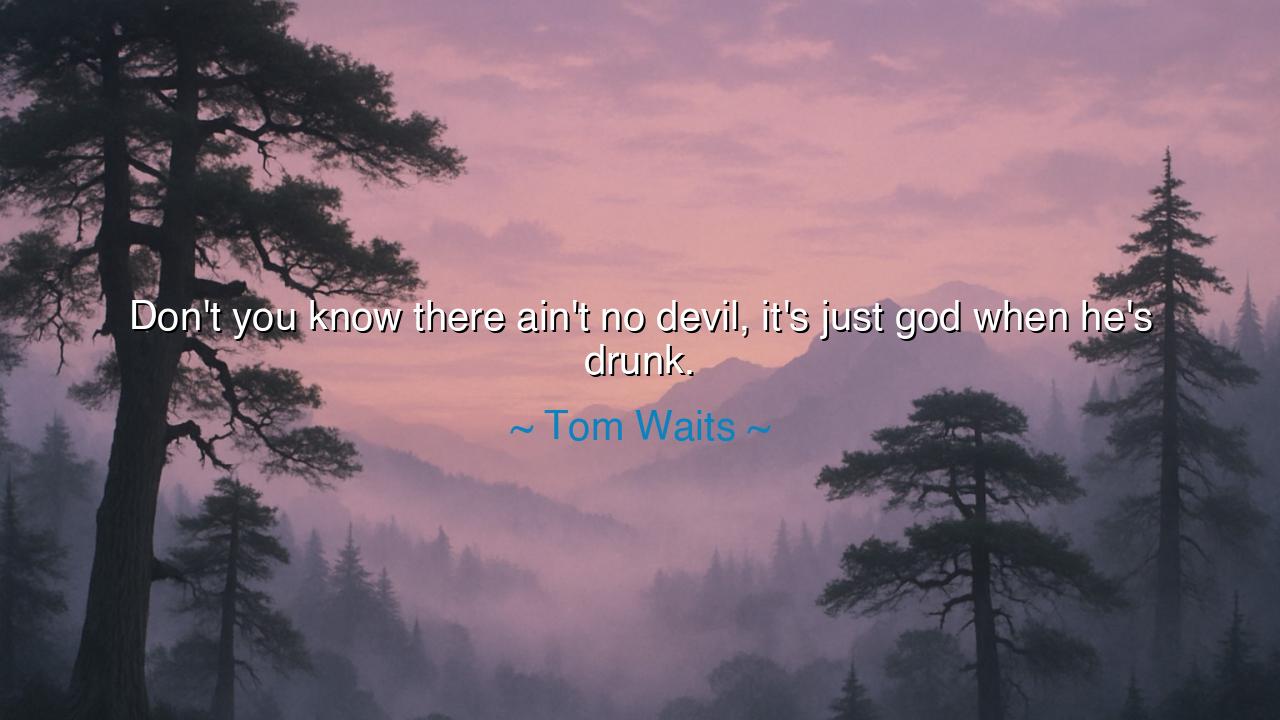
Don't you know there ain't no devil, it's just god when he's






Hear the raw and haunting words of Tom Waits, the poet of the broken alleys and the midnight soul, who sang: “Don’t you know there ain’t no devil, it’s just God when He’s drunk.” In these words lies both rebellion and revelation, the cry of a man who has peered into the shadows of existence and found divinity even there. It is not a hymn of blasphemy, as the pious might first suppose, but a song of terrible wisdom—a recognition that the line between good and evil, between order and chaos, is far thinner than we dare to believe. In his rough, whiskey-soaked voice, Waits speaks the ancient paradox: that the light and the darkness spring from the same eternal source.
The origin of this quote comes from Waits’ song Heartattack and Vine (1980), where he captures the beauty and tragedy of the human condition in a single, smoky breath. Tom Waits was not a preacher, but like the prophets of old, he saw holiness in the gutters and redemption in ruin. His words are not to be read as doctrine, but as metaphor. When he says “there ain’t no devil,” he does not deny evil; he reveals its mystery—that perhaps evil is not some alien force, but a distortion of the divine, a reflection of God’s own shadow cast across the world. To say “God when He’s drunk” is to acknowledge that creation itself, with all its chaos and cruelty, might still belong to the same trembling hands that sculpted the stars.
This thought, strange and unsettling, echoes the oldest wisdom of the mystics. The prophet Isaiah wrote that God “forms the light and creates darkness, makes peace and creates evil.” The mystic does not see two powers at war—one divine, one demonic—but one force, immense and mysterious, whose ways cannot be contained by the narrow bounds of human morality. The devil, in this sense, is not a rival god, but a symbol of the confusion and suffering that arise when the divine spark burns too fiercely in a flawed creation. Waits gives this idea a human tongue, a barroom realism: when the world staggers, when love wounds, when justice falters—it is not the devil’s dance, but God’s hand trembling through the cup of existence.
Consider the ancient story of Job, the righteous man who lost everything—his children, his wealth, his health—while heaven and hell watched in silence. Job demanded an answer for his pain, but when God finally spoke, it was not with explanation, but with thunder. “Where were you when I laid the foundations of the earth?” asked the Almighty. In that moment, Job realized that the same God who brings joy also permits sorrow, and that both serve the vast design beyond mortal sight. This is the same truth that breathes through Waits’ lyric: that suffering and salvation flow from the same divine mystery. The storm that destroys also waters the fields. The wine that gladdens the heart can also bring madness when taken too deep.
Yet, this quote is not meant to justify cruelty or despair—it is an invitation to understand the wholeness of existence. To see the divine only in beauty and order is to see with half a soul. Waits urges us to find God even in the cracked mirror, the crooked song, the trembling hand that makes mistakes. The divine presence is not absent from pain, but hidden within it. Even the broken night sky, littered with smoke and sorrow, carries the same stars that guide the pure of heart. When he says “God when He’s drunk,” Waits gives voice to the idea that divinity, as it touches this flawed world, appears through imperfection—and yet, through that imperfection, grace still gleams.
This idea is not without its peril. It demands that we walk a narrow path between reverence and rebellion, between acceptance and action. To see God’s hand in chaos does not mean to worship the chaos, but to endure it with eyes open. It means to look upon the world’s injustice and say, “Still, there is meaning.” It means to forgive life for its cruelty, without surrendering to it. Waits’ words, when stripped of their smoky irony, remind us that the sacred is not delicate—it dwells in the dirt, in the laughter of sinners and the tears of saints alike. Divinity is not fragile; it can survive our confusion.
Therefore, let this teaching be remembered: seek God not only in light, but in shadow. Do not flee the storm; listen for the whisper within it. When life feels cruel, when the heavens seem drunk with irony, do not curse them, but search their depths. Every heartbreak, every failure, every injustice hides a fragment of the divine, waiting to be recognized and redeemed. The wise learn to love even the trembling hand that shaped them, for in that trembling, they find truth.
And so, O wanderer of this sacred chaos, take comfort in the rough wisdom of Tom Waits. When the world grows dark and laughter turns to lament, remember: the devil is not the final word, and even God’s drunken moments may bear the seeds of mercy. The universe, wild and wounded though it may be, is still in the hands of its Maker—and perhaps, in the end, that is the holiest mystery of all.






AAdministratorAdministrator
Welcome, honored guests. Please leave a comment, we will respond soon